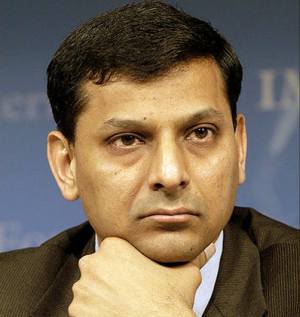
After two surprising, successive rate cuts in January and February 2015, RBI governor Raghuram Rajan decided not to reduce them further in his first policy announcement in the new financial year. Is he playing spoilsport for consumers of homes and cars?
Rajiv Raj reasons why the RBI put a brake on rate-cutting spree.
Just when we thought rate cuts were becoming more predictable than surprising, RBI's monetary policy announced status quo this time. Are they paving the way for acche din ahead or being party poopers? Read on if you are wondering what kept the RBI from hitting the rate cut hat-trick.
RBI's firm grip on the reins of our economy decides its direction and pace. Few analysts had expected a further rate cut. The expectations were justified as well, since it would be in line with the fiscal consolidation programme. However, RBI has made it clear through their actions that data is as important as making a decision to cut interest rates.
The repo rate (the short-term rate at which RBI lends money to the banks) and the Cash Reserve Ratio (a part of banks' money that they have to mandatorily keep with the RBI without earning any interest on it) remained unchanged standing at 7.5 per cent and 4 per cent respectively.
Let's delve deeper to understand the RBI's status quo stance.
Good old rate cut days
RBI had announced two rate cuts earlier this year in January and March. The repo rate was cut by 50 bps and brought down to 7.5 per cent.
Thumbs up to acche din
The rate cuts were RBI's response to fall in inflation rates. It was also in sync with the government's growth plans announced during the annual budget.
Have loans become cheaper?
Well no, and that means the previous policy impact is yet to be seen. Even though rate cut was announced by RBI, banks are yet to pass on the benefit to consumers by lowering lending rates. Hence, the effect of increased liquidity in the system is yet to be seen.
Note: Only three major lenders – SBI, HDFC Bank and ICICI Bank – reduced their base rates from 0.15 per cent to 0.25 per cent. A drop in base rates lead to fall in lending rates to consumers.
Crazy rains and it's not even June!
Untimely rains definitely did not go well with the crops. A large area under crop cultivation was damaged and this will spike up the food prices. Hailstorms in March have also led to losses. All these factors, coupled with unpredictable monsoons may lead to food shortage resulting in inflation of food prices. The risk of food price inflation is indeed looming large over the country and RBI has factored in this inflation risk while drafting the monetary policy.
Crude oil prices may shoot up
Unrest in the Middle East (Saudi Arabia-led Arab nations' attack on Yemen) may lead to a rise in crude oil prices and this will not be positive news for our inflation numbers. Definitely not favorable for further rate cuts…
Status quo for now but the future is bright
The RBI governor Raghuram Rajan said, “Next rate cut will depend on effective transmission of policy stance by banks.” Incoming data like inflation numbers, impact of previous rate cuts, etc will be guiding the monetary policy decisions. Having said that, RBI maintains that it will continue its accommodative stance (read more rate cuts), which is pro-growth.
RBI is treading carefully when it comes to taking monetary policy decisions. Currently the picture is foggy and a clearer view is expected once previous policy decisions are implemented and numbers from data reveal the true story. With various other factors at play as mentioned above, status quo is warranted as it will help reassess the situation. The second bi-monthly policy statement will be out on June 2, 2015 and what we do know for sure is that it will be data driven.
Photograph: IMF/Wikimedia Commons
The author is a credit expert with 10 years of experience in personal finance and consumer banking industry and another 7 years in credit bureau sector. Rajiv was instrumental in setting up India's first credit bureau, Credit Information Bureau (India) Limited (CIBIL). He has also worked with Citibank, Canara Bank, HDFC Bank, IDBI Bank and Experian in various capacities.











